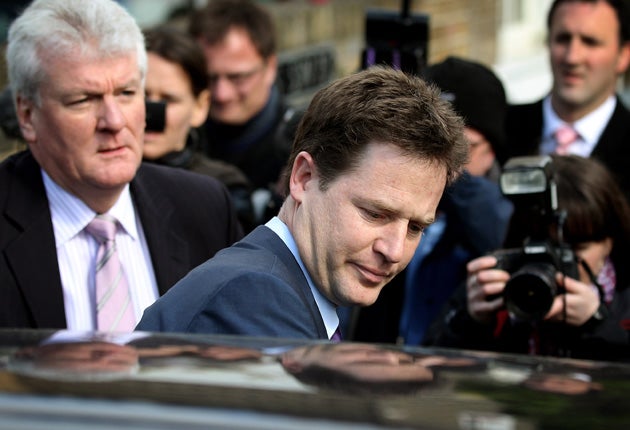Critics of deal with Tories emboldened by PM's announcement

The parliamentary Liberal Democrats were locked in talks for much of last night over whether they should join a coalition government with the Conservatives or Labour and a so-called "rainbow coalition" of smaller parties. Discussions began at 10pm and ended just after midnight, with further talks planned for today.
Earlier in the day splits emerged following Gordon Brown's 11th-hour bid to form a coalition blocking the Conservatives from taking power.
Following a morning of tough talks between Liberal Democrat and Tory negotiators, a pivotal meeting yesterday afternoon between Nick Clegg and his party's MPs and peers threw the future of Britain's next government wide open as many demanded that Labour's terms in forming a coalition be sounded out. Sources close to the talks said Mr Clegg was keen to point out the concessions secured in the possible deal with the Tories.
But some of those present feared that he and his team of negotiators had been swept up by the momentum of the talks. And the "triple lock" process through which he is obliged to secure the endorsement of his party proved effective in stalling a quick deal with the Tories. Mr Clegg then contacted Mr Brown, asking to begin formal discussions, allowing Mr Brown the chance to outflank the Conservatives.
Liberal Democrat peers and MPs had spent more than two hours locked in discussions with Mr Clegg and his negotiators to talk over what had been offered by Mr Cameron's team. During the meeting, there was little support for a "confidence and supply" deal with the Tories, which would see the Liberal Democrats allow Mr Cameron to pass his Queen's Speech through the Commons. "No one wanted to be half-pregnant," one source said.
A "sizeable minority" were keen to back a full coalition with the Tories in exchange for a "bankable offer" on reforming the electoral system. However, some were concerned Mr Cameron would allow a Tory parliamentary Bill on proportional representation to be voted down in the Lords. One senior source said a "majority" of the parliamentarians were keen for Mr Clegg to see if he could secure a more attractive deal from Labour, including further concessions on electoral reform.
Giving an official report after the talks broke up just before 4pm, David Laws, the party's education spokesman, said it had been "agreed that the leader will continue to listen to representations that are coming from the leader of the Labour Party, that clarification will be sought from the Conservative Party on the particular points". Simon Hughes, one senior figure thought to favour a "progressive coalition" with Labour, hinted at the turmoil that was to come, telling assembled journalists he would be "surprised" if a deal was done with Mr Cameron by last night. "I'm sure there will be a government by the end of the week," he added.
Figures on the party's right were nervous that locking out the Tories from No 10, after Mr Cameron secured the most seats and most votes at the election, would be grossly unfair and undemocratic. They also hinted that a deal with the Tories was still by far the most likely outcome of what looked set to be increasingly complicated negotiations. "My hunch is the deal will be done," said one frontbencher.
By 6.30pm last night, Mr Clegg had issued a glowing statement in praise of Mr Brown's move, suggesting a "Lib-Lab pact" was an increasingly attractive option. Crucially, he said it may well fulfil his party's aim of securing a stable government for Britain. "The talks with the Conservatives have been very constructive and I am grateful to David Cameron and his team for the effort they have put in. But so far we have been unable to agree a comprehensive partnership agreement for a full parliament," Mr Clegg's statement said.
"Gordon Brown has taken a difficult personal decision in the national interest. And I think, without prejudice to the talks that will now happen between Labour and the Liberal Democrats, Gordon Brown's decision is an important element which could help ensure a smooth transition to the stable government that everyone deserves."
Discipline had remained tight during the day, with all MPs reluctant to discuss what had happened in the meeting, which took place in the large Grand Committee Room, just off Parliament's historic Westminster Hall. However, there were hints even as they left the meeting that exploring a deal with Labour had been a major concern. "The arithmetic on both sides works," said one MP. "Now we must take our time and carry on talking."
It was late on Sunday night that the seriousness of the Labour offer began to emerge. As a team led by Lord Mandelson spoke to Liberal Democrat negotiators, figures close to the talks told The Independent that a "traffic light coalition" deal had become a serious alternative. They admitted Mr Brown's presence made any deal "toxic", but that removing him would open the door for an agreement which many in the party would grasp.
Subscribe to Independent Premium to bookmark this article
Want to bookmark your favourite articles and stories to read or reference later? Start your Independent Premium subscription today.

Join our commenting forum
Join thought-provoking conversations, follow other Independent readers and see their replies